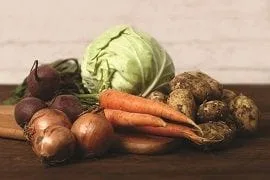The Power of the Fork
by Katherine Mueller
Are you worried about the health of the planet? Do you look forward to staying healthy and active as you age? If the answer to either of these questions is yes, consider the advantages of a whole-food, plant-based (WFPB) diet. This proposition may seem daunting, because many think immediate benefits will happen only if they make a complete switch in dietary choices. However, any change towards a plant-heavy diet is a step in the right direction.
What are we talking about? WFPB emphasizes plant-based eating, and a steep reduction in highly-processed foods. The diet emphasizes nutrient dense fruits, vegetables, legumes, grains, nuts, and seeds while reducing highly processed foods like sugars, oil, and refined flours. A good visual summary is the Power Plate by the Physicians Committee. For the purely plant-based version, animal products are completely omitted.
Is it worth it? In a report on effects of WFPB foods, Michelle Mc Macken, MD, writes “plant-based diets are naturally anti-inflammatory, because they are high in fiber, antioxidants, and other phytonutrients, and much lower in inflammatory triggers like saturated fat and endotoxins”. She continues with a list of effects that include lowering blood cholesterol levels, a healthy gut microbiome, change in gene expression, and reduced risk and even reversal of diabetes. At the tip of the fork, we have the power to either feed many common diseases, atherosclerosis, heart attacks, strokes, diabetes, cancer, and autoimmune diseases, or to make us healthier.
Will life be joyless and boring by eating only healthy foods? Luckily, our taste preferences can change in a few weeks. The beautiful reward comes in the form of many different and much more nuanced tastes from a wide variety of fruits, vegetables, herbs, and spices. Their flavors shine when not covered up by oil, salt, and sugar.
Will I get all the macro- and micronutrients? The American Dietetic Association states: “Well-planned vegetarian diets are appropriate for individuals during all stages of the life cycle”. WFPB emphasizes the “well-planned” by encouraging a mixture of nutrient-dense foods that cover protein, mineral, and vitamin requirements. (Only exception is Vitamin B12 which should be checked regularly and supplemented as required.) Remember to eat filling beans, peas, lentils, root vegetables, and whole grains for the energy they provide.
How does this diet help reduce global climate change? Animal agriculture contributes 11% to total greenhouse gases and takes up space, 77% of all agricultural land, while providing only 18% of calories. By switching to plant foods, many areas could be reforested to remove carbon from the atmosphere and be naturalized for wild life habitat.
Where to Begin? Start today with one meal! Choose something plant-based you like to eat and continue building from there. Find a support group. There are seven “Plant-Pure Pods” in the Houston area with folks who can educate and cheer you on!
Find all Pods at PlantPurePods.com



